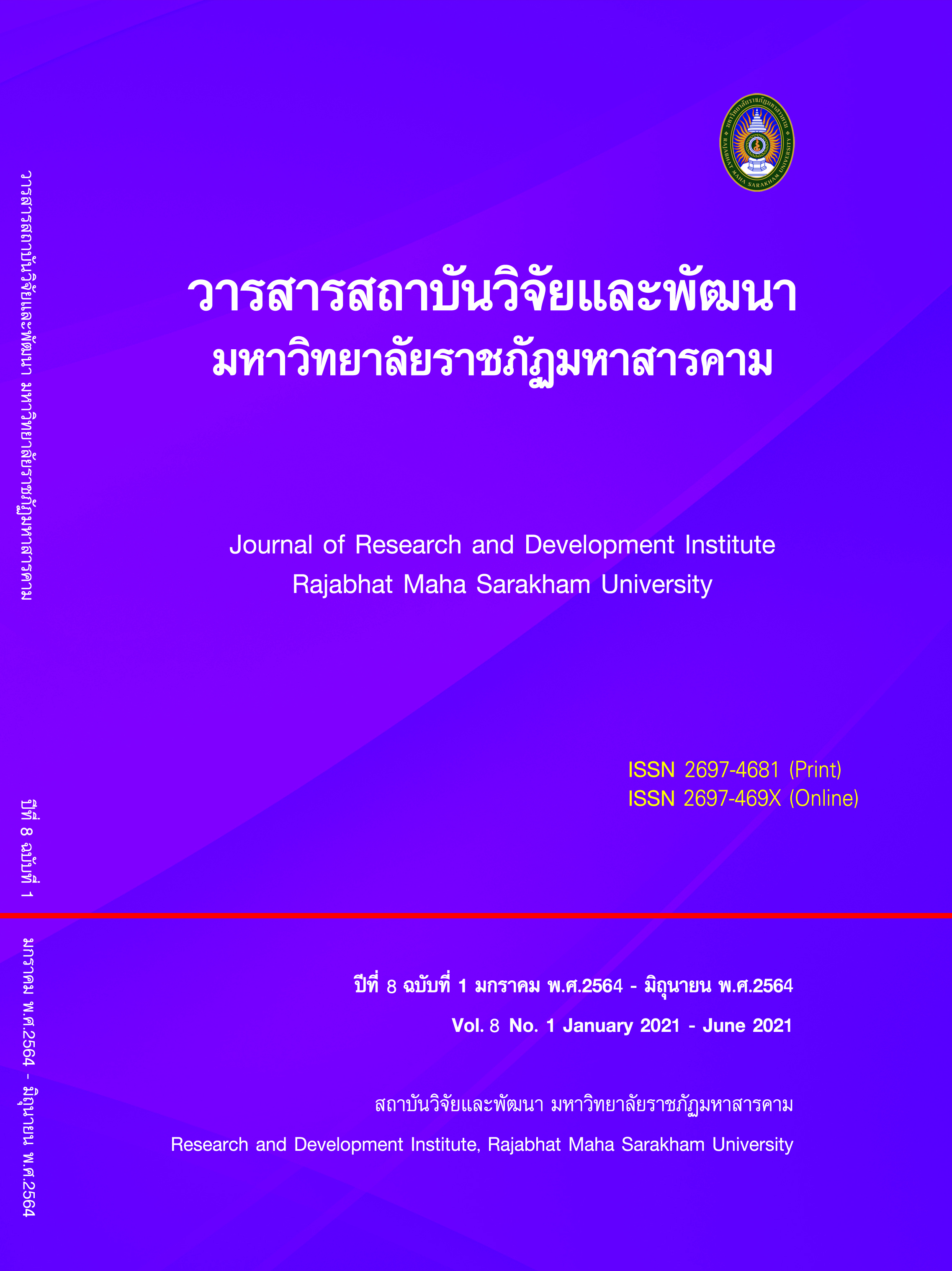The Current State and the Development of the Quality Education Administration under the Secondary Educational Service Area Office 26
Keywords:
current state, development guidelines, management of the quality educationAbstract
The purposes of this research were to 1.) study the current state of the quality education administration under the secondary educational service area office 26 and 2.) study the development of the quality education administration under the secondary educational service area office 26. The research procedures were divided into two phrases. The first stage was to study the current state of the quality education of schools. The samples were included 307 ; 78 administrators and 229 teachers. The research instrument was a 5- criterion questionnaire with 0.79 in reliability and statistic used for data analysis was the mean, percentage and standard deviation. The second stage was to study the method of the development quality education administration of schools under the secondary educational service area office 26 by studying from 9 experts. The research tool was the interview and content analysis was used for data analysis.
The results found that:
- The study the current state of the quality education administration under the secondary educational service area office 26 in overall was the highest level in ordering from highest average to lowest average ; 1) the educational quality assurance 2) the administration development 3) participation and 4) teachers and staff training respectively.
- The method of the development of the quality education administration under the secondary educational service area office 26 consisted of 1) supporting teachers and staff for research development and innovation for the content of Thailand 4.0 education 2) the opportunity of the stakeholders for the decision in school project s and activities 3) cooperative administration with the stakeholders and the school board for the school profit and the school evaluation and 4) the continuation of project for teacher’s plan development and qualitative evaluation.
References
Chatakan, W. (2008). Management Techniques for Professional Education Administrators. Bangkok: Chulalongkorn University.
Duangkaew, R. (2016). Educational quality development in the collection of policies, plans, and educational quality development. Nonthaburi: Sukhothai Thammathirat Open University.
Education Council Secretariat. (2009). Problem conditions and solutions for teaching and learning management that affect quality development affecting learner quality development at the basic education level. Bangkok: V.T.C.Communication.
Education Council Secretariat. (2011). Second Decade Education Reform Proposal (2009-2018). Bangkok: Prik Wan Graphic Co., Ltd.
Kangpeng, S and Choosorn, P. (2014). Globalization Leadership. Khon Kaen: Nana Wittaya Archives.
Krejcie, R. V. & Morgan, D. W. (1970). Determining Sample Size for Research Activities. Educational and Psychological Measurement. Vol. 30(3), P. 607–610.
Ministry of Education. (2008). Basic Education Core Curriculum.2008. Bangkok: Chumphon Printing House Agricultural Cooperatives of Thailand. Ltd.
Ministry of Education. (2010). Ministerial Regulation on Criteria System and Educational Quality Assurance 2010. Bangkok: Siam Sport Syndicate.
Namsiri, S. (2009). Developing academic work with the principle of integration in small schools: Participative Action Research. Khon Kaen: Khon Kaen University.
Office of the Basic Education Commission. (2018). Guidelines for quality assessment according to early childhood education standards Basic education level and basic education level, special education center. Bangkok: Bureau of Educational Standards Office of the Basic Education Commission.
Phoojomjit, P. (2012). Development of service-oriented leadership indicators of basic education administrators. Master’s Thesis: Maha Sarakham: Maha Sarakham Rajabhat University.
Polkul, K. (2017). Development of educational quality management model for small schools Under the Office of Buriram Primary Education Area 1 by applying the philosophy of sufficiency economy. Master’s thesis: Maha Sarakham Rajabhat University.
Pornrungroj, C. (2012). Transcending the Limits to the Millennium of Quality. Bangkok: Chino Publishing and Packaging.
Siriphan, A. (2017). Development of Educational Quality Management Models for Operational Excellence, Faculty of Industrial Technology Rajabhat University. Journal of Industrial Education King Mongkut, North Bangkok. Vol. 8(2) July – December 2017.
Teeasana, S. (2014). New Quality Management Techniques: Concepts and Principles for Educational Quality Management. Maha Sarakham: Maha Sarakham Rajabhat University.
Wesarat, P. (2011). Principles of Educational Management. Bangkok: Office of Education Reform.
Downloads
Published
How to Cite
Issue
Section
License
Copyright (c) 2021 Journal of Research and Development Institute Rajabhat Maha Sarakham University

This work is licensed under a Creative Commons Attribution-NonCommercial-NoDerivatives 4.0 International License.
Articles that are published are copyrighted by the authors of the articles







